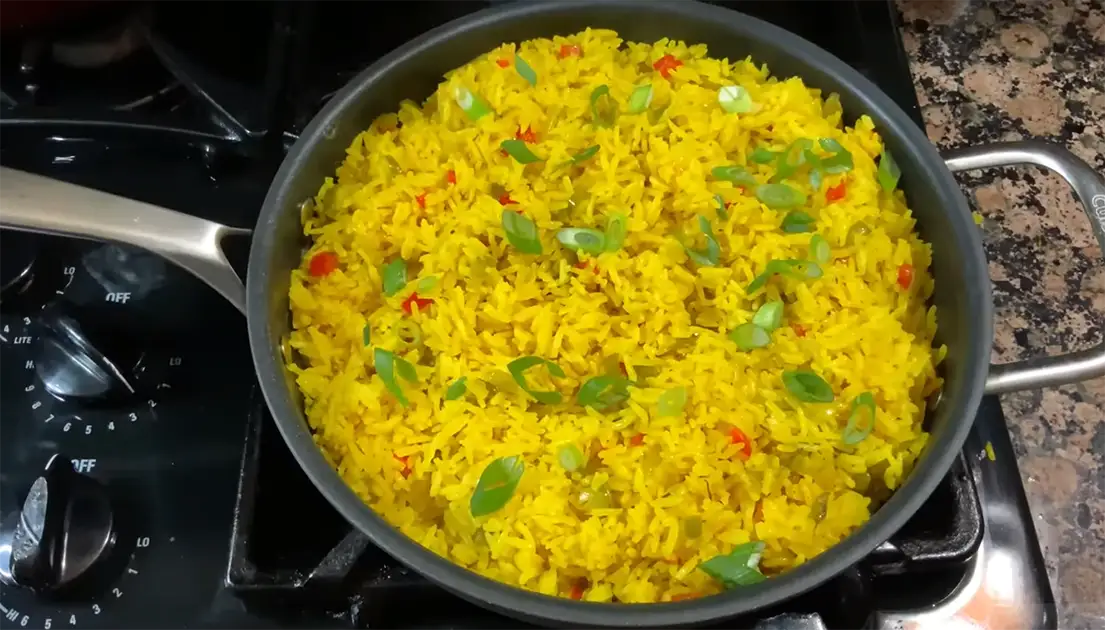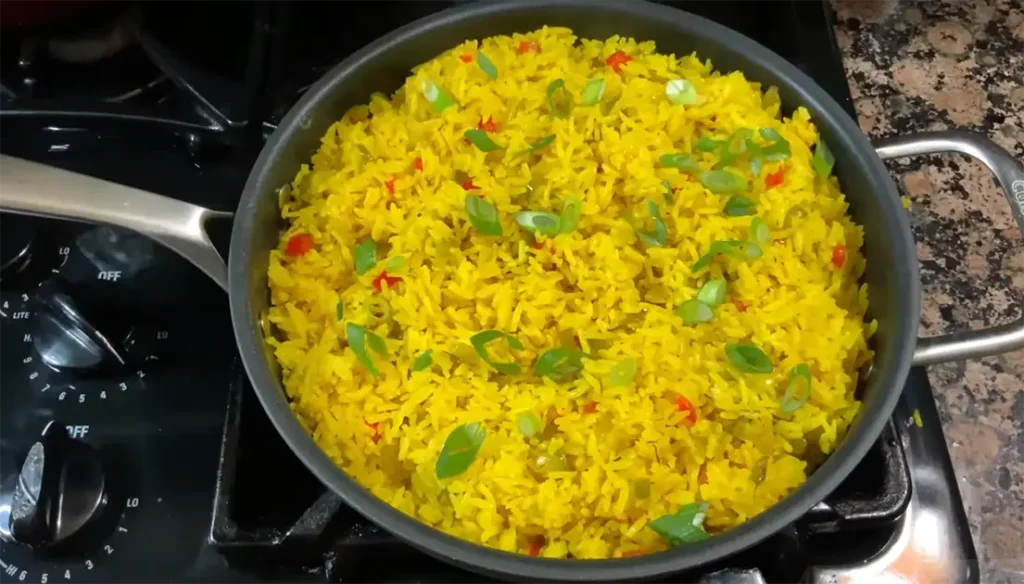√√ REVIEWED & FACT-CHECKED BY
Can Dogs Eat Yellow Rice? When it comes to feeding your dog yellow rice, caution is key. While yellow rice contains ingredients like rice and turmeric, which offer nutritional benefits, it also typically includes spices that may pose risks to your pet’s health.
Onions and garlic common in yellow rice are toxic to dogs. The high carb content, including in yellow rice, may not suit all dogs, especially those with health issues like diabetes.
While small amounts occasionally may be safe, prioritize health over culinary experimentation.
Can Dogs Eat Yellow Rice?
When deciding whether yellow rice is safe for dogs, it’s important to weigh the potential benefits and risks.
Yellow rice typically contains rice, turmeric, and spices, offering some nutritional value to our furry friends. However, caution is warranted as spices like onions or garlic, often found in yellow rice, can harm dogs in large amounts.
Moreover, the high carbohydrate content may not suit all dogs, especially those with specific dietary needs or diabetes.
While a bit of plain yellow rice might serve as an occasional treat, consulting your vet beforehand is wise. They can offer tailored advice based on your dog’s health and dietary needs, ensuring any additions promote their well-being.
Is Rice Good for Dogs?

The alluring aroma and vibrant color of yellow rice might entice dog owners to share it with their furry friends. While it offers potential benefits such as carbs from rice and anti-inflammatory properties from turmeric, caution is crucial.
Turmeric can help dogs with arthritis, but ingredients like onions or garlic can upset their stomachs. Moreover, the high carb content may not be suitable for all dogs, especially those with diabetes or specific dietary needs.
Consulting a vet beforehand is wise, ensuring any dietary changes suit individual health requirements. Responsible dog ownership means prioritizing their well-being and making informed choices about yellow rice consumption.
Why Is Yellow Rice Harmful to Dogs?
Yellow rice can be harmful to dogs due to several reasons:
- Toxic Ingredients: Onions and garlic, commonly found in yellow rice, are toxic to dogs and can lead to gastrointestinal upset and potentially severe conditions like hemolytic anemia.
- High Carbohydrate Content: Like other types of rice, yellow rice has a high carbohydrate content. Excessive consumption can contribute to weight gain and health issues such as diabetes and joint problems.
- Spices and Seasonings: Yellow rice recipes often include spices and seasonings that may not be suitable for dogs. While some ingredients like turmeric can be beneficial, others may cause digestive discomfort or allergic reactions.
- Digestive Issues: Dogs may struggle to digest certain components of yellow rice, leading to gastrointestinal distress including bloating, gas, and constipation.
Dog owners should avoid feeding yellow rice to their pets and be vigilant about any potential ingestion. If ingestion occurs, contact a veterinarian promptly for guidance and treatment.”
What Other Foods Should Dogs Avoid?
Here’s the list of foods that dogs should avoid:
- Chocolate
- Grapes and raisins
- Onions and garlic
- Avocado
- Alcohol
- Xylitol (artificial sweetener)
- Macadamia nuts
- Bones, especially cooked bones
- Raw meat and fish
- Dairy products, especially in large quantities
Can dogs eat white rice?
White rice is commonly recommended for dogs, especially during digestive issues, owing to its easy digestibility compared to brown rice.
Its removal of the outer hull and bran layers makes it gentle on the stomach, providing a bland source of carbohydrates that offer energy without taxing the digestive system.
Veterinarians often suggest small portions of plain, cooked white rice as part of a bland diet during gastrointestinal upset or transitions to new food.
However, it’s crucial to avoid adding spices, seasonings, or oils, as these can disrupt a dog’s digestion and even be toxic. While beneficial in moderation, white rice should complement a balanced diet tailored to a dog’s nutritional needs.
Can Dogs Have Jasmine Rice

Jasmine rice, known for its fragrant aroma and sticky texture, can be included in a dog’s diet with caution. While dogs can consume jasmine rice in moderation, it primarily consists of carbohydrates lacking essential nutrients.
Plain, cooked jasmine rice may be safe for occasional consumption or during gastrointestinal upset, but it shouldn’t replace a balanced diet.
Some dogs may experience digestive issues like diarrhea or bloating, so owners should monitor their reaction closely.
Consulting with a veterinarian before adding jasmine rice to a dog’s regular diet is essential. While it can be part of a dog’s diet in moderation, it shouldn’t be a staple food, considering the individual dog’s dietary requirements and health status.
Is basmati Rice Okay For Dogs
Basmati rice is generally safe for dogs in moderation, serving as a source of carbohydrates for energy. It’s easy digestibility makes it suitable for dogs with sensitive stomachs.
When introducing basmati rice to a dog’s diet, start with small portions and monitor for adverse reactions.
Serve plain and cooked thoroughly to avoid potential issues from added spices, oils, or seasonings. Consulting a veterinarian before significant dietary changes ensures alignment with a dog’s nutritional needs and overall health.
Can My Dogs Have Wild Rice
Wild rice, with its nutty flavor and chewy texture, is safe for dogs to eat in moderation. The primary source of energy in this food is carbohydrates, as well as protein and fiber, which aid in digestion.
Serve cooked wild rice without added spices, oils, or seasonings. While nutritious, it shouldn’t replace essential nutrients from balanced commercial dog food. Introduce wild rice gradually and monitor for adverse reactions.
Discontinue if digestive issues occur and consult a veterinarian. While suitable as an occasional treat or part of a balanced meal, prioritize a diet meeting a dog’s specific nutritional needs and seek veterinary guidance for personalized recommendations.
Can Dogs Eat Brown Rice
Brown rice, a whole grain rice variety, is safe for dogs and offers several health benefits.
Rich in carbohydrates, it provides energy and contains higher fiber and nutrient levels than white rice. The additional fiber aids digestion and bowel regularity, especially beneficial for dogs with gastrointestinal issues.
Brown rice also provides essential nutrients like vitamins, minerals, and antioxidants, promoting overall health.
It’s important to cook brown rice thoroughly and serve it plain, without added spices or oils, to avoid digestive discomfort. While it is nutritious, it should be consumed in conjunction with other forms of protein for a balanced diet.
Introduce gradually, monitor for adverse reactions, and consult a veterinarian if needed. Overall, brown rice is a healthy option for dogs in moderation.
Can Dogs Eat Rice Everyday?
Feeding rice to dogs regularly can be part of a balanced diet, but it’s crucial to consider several factors beforehand.
Rice, whether white, brown, jasmine, or wild, provides dogs with carbohydrates for energy and is easily digestible, suitable for those with sensitive stomachs.
However, it shouldn’t dominate the meal; dogs need a balanced diet with protein, fats, vitamins, and minerals. Pairing rice with high-quality protein sources like lean meats, fish, or eggs, along with vegetables and fruits, ensures a well-rounded diet.
Feeding large rice quantities regularly may lead to weight gain or health issues, especially in dogs prone to obesity or diabetes. Consult a vet to determine the appropriate rice amount based on age, weight, and health, and monitor well-being for a healthy lifestyle.
Conclusion
In conclusion, while yellow rice can be added to a dog’s diet, caution is crucial. We’ve explored both the benefits and risks associated with feeding yellow rice to dogs, highlighting potential issues like harmful additives and high carbohydrate content.
Pet owners should prioritize their dog’s health and consult with a veterinarian before introducing new foods. Veterinarians can offer personalized guidance to ensure dietary additions align with a dog’s well-being.
By exercising caution and seeking professional advice, pet owners can make informed decisions for their dog’s long-term health and happiness.
FAQs
Is plain rice safe for dogs?
Plain rice is generally safe for dogs, serving as a bland and easily digestible carbohydrate source, particularly beneficial for dogs with gastrointestinal issues. However, flavored or seasoned rice should be avoided due to potential harmful additives like onions or garlic.
What are the potential symptoms of rice poisoning in dogs?
Common symptoms of rice poisoning in dogs include vomiting, diarrhea, abdominal pain, lethargy, and dehydration. If your dog exhibits any of these signs after consuming rice, seek veterinary assistance immediately.
Can Dogs Eat white rice?
Yes, dogs can safely eat white rice, often recommended for digestive upset. Plain, cooked white rice without added spices or seasonings is best.
How can I safely introduce rice into my dog’s diet?
To safely introduce rice, start with plain, thoroughly cooked rice without additives. Begin with small portions, gradually increasing over several days, and monitor for adverse reactions.
Can Dogs Eat Brown Rice Instead?
Yes, dogs can eat brown rice as an alternative to white rice, offering additional nutritional benefits due to higher fiber and nutrient content.
Can dogs eat Spanish yellow rice?
It’s best to avoid feeding dogs Spanish yellow rice, as it often contains spices like onions or garlic, which can be toxic.
Can Puppies Eat Rice?
Yes, puppies can eat rice, but introduce it gradually and ensure it’s thoroughly cooked for easy digestion.
Can Dogs Eat Undercooked Rice?
Avoid feeding dogs undercooked rice, as it may cause gastrointestinal upset.
How Much Brown Rice For Dogs?
The amount of brown rice depends on factors like size, age, and activity level. Consult your veterinarian about the appropriate portion sizes.
Can Dogs Eat Yellow Rice With Saffron?
Avoid feeding your dogs yellow rice with saffron, as saffron can be toxic in large quantities.







